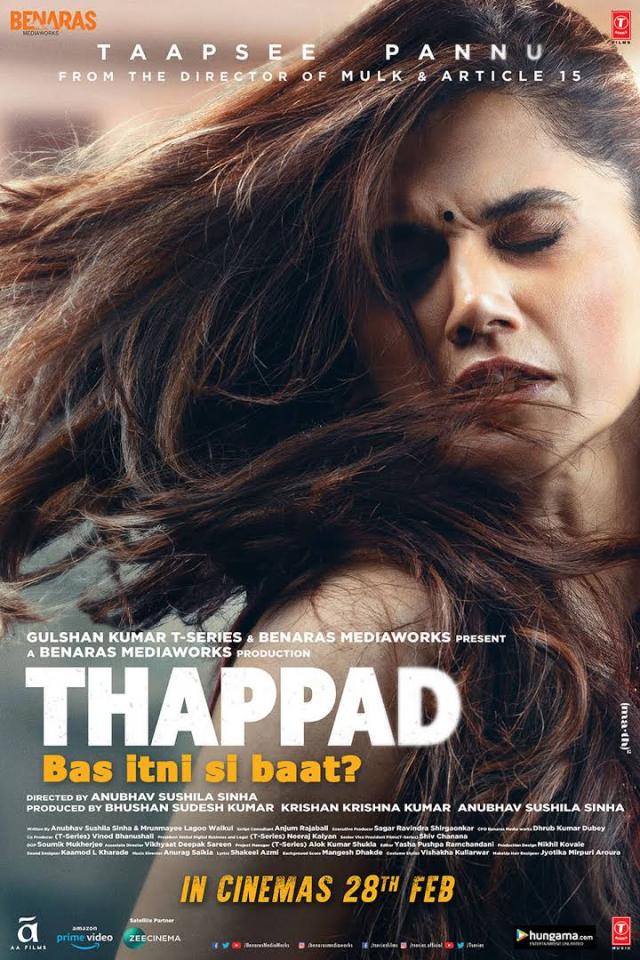So poignant that it has the power to open very old wounds and evoke the pain it used to cause with brutal force.
Thappad – the actual slap – is just the trigger that jolted Amrita enough to make her see what’s going on in her marriage, but
- it hurts more to be treated as if you are invisible every day
- it hurst more if your opinions don’t matter
- it hurts more if what and who you love do not matter
- it hurts more if you are just an outlet of another person’s negative emotions
- it hurts more when you are verbally abused
- it hurts more when no one doubts the man
- it hurts more when lies are told about you that are nowhere close to reality
- it hurts more when your contributions are not only not acknowledged but always fall short somehow
- it hurts more if you are expected to “compromise” – and you are the only one asked to do that
- it hurts more when the consequences of a divorce don’t change anything in a man’s life but ruthlessly rip apart the fabric of a woman’s life
This is just a short list of the wounds a bad marriage inflicts. The torture is incessant and invisible to most because our society has conditioned women to stay quiet, compromise, deal with it, figure it out, hope for the best, kill their intellect and emotions…
The Thappad served as a catalyst for the lead character to take action but often women get asked why did YOU not end the marriage. Let me answer this: because when you are in a marriage like this you are being slow boiled like a frog. Bad turns to worse and worse turns to worst and before you know it you are dead! Too dead and drained to take any action. You fear for your family, you fear for yourself, you fear for the helplessness you will have to face because you have been taught that marriages are a permanent thing and there is no looking back.
Another question that gets asked is: Did he ever hit you? Does it really matter? The million cuts inflicted upon a person through constant mental abuse are far deeper reaching than any physical action. Why discount them and wait for that slap?
The ones that are lucky, either experience a catalyst like Amrita that thrusts them into action or they are set free by their jailor because they have done as much damage to you as they could.
I wish these stories were told earlier – much earlier – to show women that they have options. This needs to be heard loud and clear so no one ever has to experience the pain that has been hammered into our relationships by society without even blinking an eye.
Thappad ingeniously creates contrast by showing not one but seven different stories:
- Amrita’s marriage with Vikram
- Amrita’s parents’ marriage
- Vikram’s parents’ marriage
- Sunita’s marriage with her husband
- Nethra’s marriage with Manav
- Karan’s engagement with Swati
- Shivani’s widowhood
Each story is different and covers a wide spectrum of what a relationship can look like and each character is chiseled to precisely draw out the essence of that relationship. The director had to make the characters so pointed because there were too many to portray. Had he been more subtle with them the viewers might not have caught on to the differences he was trying to highlight.
The most interesting contrast is that between Amrita’s and Sunita’s marriages. Amrita is married to a young, affluent corporate C-level while Sunita, her maid, is married to a drunkard poor man. While the former is abused in more “subtle” ways until the Thappad happens, the later is abused physically on a regular basis. But why is it more “normal”, almost “acceptable,” when Sunita gets beaten up so often? To the extent that she just jokes about it with her employer. However, when Amrita is slapped we – the audience – feel a certain way. We are shocked. We know this wasn’t supposed to happen. But why? Does the social strata of a relationship justify certain actions more than others?
Another phenomenon that the director beautifully draws out is that it’s not just men vs women it’s just as much women vs women. Mothers treating their sons like deities, mothers telling their daughters to just figure it out in private, mother-in-laws pampering their son-in-laws even when they don’t deserve it, mother-in-laws expecting the sky out of their daughter-in-laws, even other abused women questioning a woman’s decision to free herself.
Excellent acting all around but Geetika Vidya Ohlyan is the one that takes away the trophy here. What a powerhouse performer! Not once did I think she may not be a maid in real life. The melting of an actor with a character to this extent is worth its salt.
The only reason I am not rating this movie a full 10/10 is because the protagonist kept insisting that it’s the Thappad that is making her take a divorce which diminishes everything else that underlies the Thappad and is a far worse crime. (9/10)
I’ll let you in on one more little secret: Physical abuse is terrible but it doesn’t leave the same marks as mental abuse! It takes a village and extraordinary perseverance to stitch back together that broken person. Some make it, some don’t.
